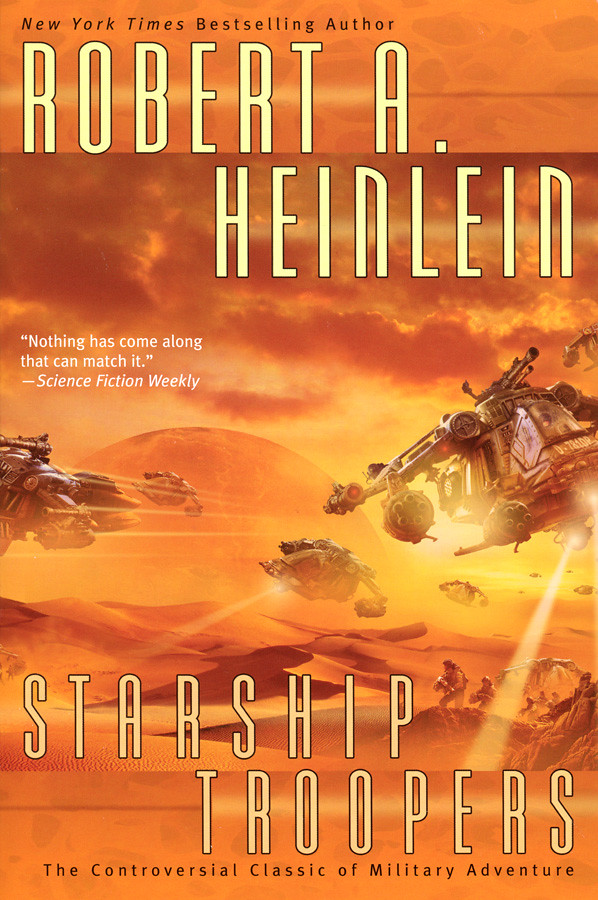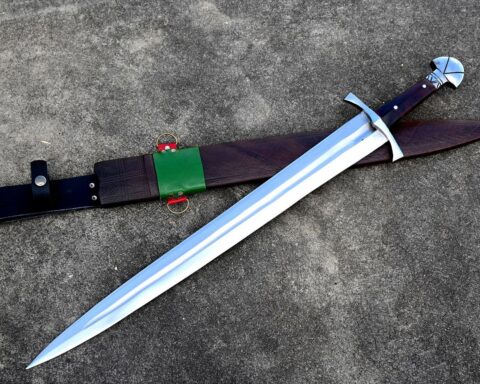The book. Not the movie. If you can even call Verhoeven’s bastardization “Starship Troopers” at all.
Robert A. Heinlein is an increasingly controversial figure in recent years, moreso than he was in his lifetime. This, of course, is due to his dubious content in his later career. But he was nothing if not influential on the genre, and his early works, such as his juvenile novels (of which this was the last), remain worth a read. We may go into Heinlein’s other works later, but the focus is not so much on the man as on the book.
As with the rest of this series, the idea is a brief introduction to the book, rather than an in-depth analysis. As Starship Troopers is the most influential book in military science fiction ever written, there exist plenty of other places to read in-depth analysis. Indeed, the story itself is a story of ideas, a philosophical work.
The story of Starship Troopers is the story of Johnny Rico, a recruit into the Mobile Infantry, and the plot carries us through his training, his battles, the loss of his friends, his rise through the ranks, and ultimately his command as he and his forces prepare for humanity’s battle against the Pseudo-Arachnids on their homeworld of Klendathu. In that sense, it is a “coming of age” story. But as above, it is also a dialogue about philosophy.
So, what makes this influential?
I. The Politics. The political system in Starship Troopers is often called “fascist,” but that is incorrect. The political conceits that Heinlein used were Republican–not in the American political-party sense, but in the ancient Roman sense, mixed with the early American representative-Republic ideal. One man, one vote wasn’t so much a thing. Instead it was one landowner-one vote. In a futuristic urban society, this is impractical, so another means of attaining a vote is necessary for a functioning republic. In Heinlein’s universe, this meant Federal Service. Heinlein later wrote that there was confusion in what he meant by that–most assumed it meant military service, but he later clarified that 95% of the participants in Federal Service were non-military roles.
II. The Technology. While Heinlein wasn’t the first to use use literally mechanized soldiers (the Mobile Infantry) in science fiction, he was the first to popularize them. In real life, mechanized infantry are forces who are equipped with various armored fighting vehicles, APCs, and other gear to get them around the battlefield more quickly than motorized or regular infantry. In Heinlein’s world, they are similar, but with high-tech individual power-armor with various loadouts that are dropped from orbiting spacecraft onto the target area of operations.And we get glimpses of the kinds of weapons the Mobile Infantry use, ranging from flamethrowers to personal tactical nuclear weapons to nerve-gas that affects the bugs. And of course, there is faster-than-light travel, and hints of things like the Nova bombs at the end of the book. Most of these elements that weren’t already tropes have become tropes.
III. The Enemy. Again, Heinlein wasn’t the first to have nameless, faceless, ruthless opponents in a science fiction novel, but the sheer brutality of the Pseudo-Arachnids combined with their insect-like caste system and hive-mind remains one of the best examples in sci-fi history. And let’s not forget the Skinnies, who were at first aligned with the Psuedo-Arachnids but later switched sides.
IV. The Heroes. Johnny Rico is the protagonist, of course, but Heinlein gave–and took away–a number of great characters throughout the book. Flores, Dubois, Rasczak. They were all convincing characters, many of whom likable, and those who died, well, you’re sorry to see them go. Heinlein was killing off good characters before it was cool.
This post is already getting a bit long. I may return to revise it later (I reserve that right with any of these posts). But look: if you haven’t yet, go out and buy the book. It’s worth every penny, and if you like science fiction, you’ll not regret it. And while I despise the movies, I can in good conscience recommend the short-lived CGI series, Roughnecks: The Starship Troopers Chronicles. It’s the best parts of the movies adapted to be more in line with the original book. Not totally faithful, but better than Verhoeven’s garbage-tier adaptation.
And if you enjoy my content, consider picking up some merch from my shop. Right now I need funds to get my studio set up to do the podcast right. And the more I earn, the more I can justify writing as well.










[…] Fiction (Men of the West): The book. Not the movie. If you can even call Verhoeven’s bastardization “Starship […]
The movie was supposed to be satire, done by a director who was too stupid to understand the object of his derision. The book is simply a tribute to the grunt, the 19 year old kid with a rifle who is sent to various exotic (aka dangerous) lands in the name of national policy. Johnny Rico is the freezing exfarmer at Valley Forge, the frightened Marine on Iwo Jima, and the scared national guardsman in Afghanistan. No, Heinlein didn’t really believe that military folks should run things, he just believed we should respect the sacrifices that members of the military make.
[…] Fiction (Men of the West): The book. Not the movie. If you can even call Verhoeven’s bastardization “Starship […]